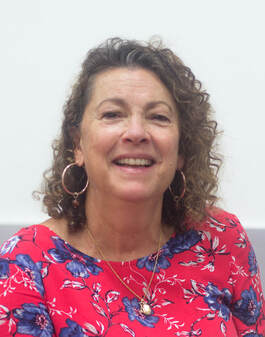2019 Exeter Novel Prize
Find out about the authors and read literary agent Broo Doherty's reports on the winning and shortlisted novels.
Find out about the authors and read literary agent Broo Doherty's reports on the winning and shortlisted novels.
Winner
For the Record - Sara Green
Nora Wojnawski is 122 years and four months old and about to become the world’s oldest person ever. Her large extended family believe this is something that needs to be celebrated – and celebrated in style. Nora has other ideas. When Debs, her great-granddaugher turns up in Nora’s sheltered accommodation to discuss the final points of the party – champagne, canapes and the press, the Guinness Book of Records no less – Nora has disappeared. Cue panic from the entire family as you come to realise that this anniversary is about them as much as about Nora. No one has any idea where she might have gone, but she is tracked down living with Arifa, her favourite personal carer from the home, and Arifa’s son, Nasir, who Nora is convinced is her son, David (who is fact is 90 and living in the same home as her). It gradually emerges that Arifa and Nasir are Syrian refuges, and that Arifa is an excellent, highly qualified doctor. The family endeavour to persuade Nora to return to her home, but she is having none of it, and as the novel progresses she fully engages with Arifa and her family, taking them on trips to the East End to see where post-war she and her husband had a grocery shop and generally reliving her life through them. She teaches Nasir how to play poker, while resolutely maintaining the belief that he is in fact David.
But on one such outing to a Jewish Cemetery, Amelia, Deb’s daughter, trips and falls into a coma. She is rushed to hospital and round her bedside Nora, Debs and Arifa grow closer together, as they bond through their respective roles as mothers. And it is only once Amelia recovers and the party is allowed to go ahead, on the site of her former grocery, Nora reveals one final secret.
In turn, lively and poignant, For the Record has a wonderful atmosphere and a wry humour that immediately draws you in. Nora is a fabulously bad tempered and attractive character, wily and irreverent, who plays life by her rules – and why not now that she is almost the oldest person in the world? Her relationships with other women are based on integrity, and that’s what makes her so attractive. She is not persuaded by fame, money (of which she has never had any in her entire life) or flattery. She is just the archetypal Jewish mama who teaches everyone how to chop liver (and remember it needs lots of salt), and play poker. Reminiscent in tone to Harold Fry, this is a glorious piece of escapism about love and family dynamics, but it highlights for me that we can’t afford to ignore the elderly; they have a lot to teach us.
For the Record - Sara Green
Nora Wojnawski is 122 years and four months old and about to become the world’s oldest person ever. Her large extended family believe this is something that needs to be celebrated – and celebrated in style. Nora has other ideas. When Debs, her great-granddaugher turns up in Nora’s sheltered accommodation to discuss the final points of the party – champagne, canapes and the press, the Guinness Book of Records no less – Nora has disappeared. Cue panic from the entire family as you come to realise that this anniversary is about them as much as about Nora. No one has any idea where she might have gone, but she is tracked down living with Arifa, her favourite personal carer from the home, and Arifa’s son, Nasir, who Nora is convinced is her son, David (who is fact is 90 and living in the same home as her). It gradually emerges that Arifa and Nasir are Syrian refuges, and that Arifa is an excellent, highly qualified doctor. The family endeavour to persuade Nora to return to her home, but she is having none of it, and as the novel progresses she fully engages with Arifa and her family, taking them on trips to the East End to see where post-war she and her husband had a grocery shop and generally reliving her life through them. She teaches Nasir how to play poker, while resolutely maintaining the belief that he is in fact David.
But on one such outing to a Jewish Cemetery, Amelia, Deb’s daughter, trips and falls into a coma. She is rushed to hospital and round her bedside Nora, Debs and Arifa grow closer together, as they bond through their respective roles as mothers. And it is only once Amelia recovers and the party is allowed to go ahead, on the site of her former grocery, Nora reveals one final secret.
In turn, lively and poignant, For the Record has a wonderful atmosphere and a wry humour that immediately draws you in. Nora is a fabulously bad tempered and attractive character, wily and irreverent, who plays life by her rules – and why not now that she is almost the oldest person in the world? Her relationships with other women are based on integrity, and that’s what makes her so attractive. She is not persuaded by fame, money (of which she has never had any in her entire life) or flattery. She is just the archetypal Jewish mama who teaches everyone how to chop liver (and remember it needs lots of salt), and play poker. Reminiscent in tone to Harold Fry, this is a glorious piece of escapism about love and family dynamics, but it highlights for me that we can’t afford to ignore the elderly; they have a lot to teach us.
|
Sara Green is an award-winning writer whose short stories have been published in anthologies including An Earthless Melting Pot and Refugees Welcome. Her first novel, A Life in Boxes took second prize in the Yeovil Novel Competition.
Sara lives and works in Lyon, France. She is broadcast and print journalist and copywriter with over twenty years’ experience in international radio, television and corporate communications. Sara speaks fluent French and Spanish as well as a little Italian and Portuguese. When not writing or running around after her three daughters, she is often walking, swimming lengths or getting lost in Venice. Sara is on Twitter @saracategreen |
Shortlisted novels - alphabetical by title
All the White Spaces - Ally Wilkes
Winter 1918 and the First World War is over. Jo Morgan learns that both his brothers have been killed days before being repatriated, and having a difficult relationship with both his parents he is at a loss as to what the future will hold. However, he decides to fulfil one of his brothers’ greatest dreams – to visit Antarctica in their place. Stowing away on board The Fortitude with his brothers’ best friend, Harry, Jo from now on known as Jonathan experiences life in the raw and learns what it means to be a man. As Harry grows increasingly distant, Jonathan forges a relationship with Randall and the other men, but when a mysterious fire takes hold of the ship, he learns what it means to face one’s demons and he elects to live for the future rather than remain rooted in the past.
The intensity of the writing here is superb – the opening chapters highlight the contrast between the two lives that Jonathan has chosen to live. Initially we see him raised as a girl living in a privileged but stifling country house, with parents mourning the loss of their two legendary sons, realising that he has always been considered second best. And then when he boards The Fortitude he struggles to become the ideal man, and mate, determined to realise his adored brothers’ dream, at great personal cost. The author depicts life on board ship brilliantly, the claustrophobia, the determination to survive, the hideous conditions and the daily fear Jonathan lives with of being discovered. The price for stowaways is death. Atmospheric, powerful and historically accurate, this certainly merited a place on the shortlist and having a personal fascination with Antarctica certainly struck a chord with me. I would love to see how the story unravels, how the author deals with Jonathan’s growth as a man, and how he learns to come to terms the ghosts of his brothers.
Winter 1918 and the First World War is over. Jo Morgan learns that both his brothers have been killed days before being repatriated, and having a difficult relationship with both his parents he is at a loss as to what the future will hold. However, he decides to fulfil one of his brothers’ greatest dreams – to visit Antarctica in their place. Stowing away on board The Fortitude with his brothers’ best friend, Harry, Jo from now on known as Jonathan experiences life in the raw and learns what it means to be a man. As Harry grows increasingly distant, Jonathan forges a relationship with Randall and the other men, but when a mysterious fire takes hold of the ship, he learns what it means to face one’s demons and he elects to live for the future rather than remain rooted in the past.
The intensity of the writing here is superb – the opening chapters highlight the contrast between the two lives that Jonathan has chosen to live. Initially we see him raised as a girl living in a privileged but stifling country house, with parents mourning the loss of their two legendary sons, realising that he has always been considered second best. And then when he boards The Fortitude he struggles to become the ideal man, and mate, determined to realise his adored brothers’ dream, at great personal cost. The author depicts life on board ship brilliantly, the claustrophobia, the determination to survive, the hideous conditions and the daily fear Jonathan lives with of being discovered. The price for stowaways is death. Atmospheric, powerful and historically accurate, this certainly merited a place on the shortlist and having a personal fascination with Antarctica certainly struck a chord with me. I would love to see how the story unravels, how the author deals with Jonathan’s growth as a man, and how he learns to come to terms the ghosts of his brothers.
|
A former criminal barrister, I’m fascinated by how extreme situations bring out the best – or worst – in people. All the White Spaces was born from my love of supernatural horror and lifelong obsession with the Heroic Age of Antarctic exploration; I wanted to give a fresh perspective on this very masculine world. For the maritime details, I’ve visited Scott’s Discovery in dry dock, and sailed the Baltic Sea on a vintage sailing ship – in full period costume. A graduate of Curtis Brown Creative’s 6-month novel-writing course, I’m now represented by Oli Munson at AM Heath Ltd, and on Twitter @UnheimlichManvr.
|
An Infamous Seduction - Glenda Cooper
Hyderabad,1799, pre-Raj India. Two little girls, Mary-Ann and Jeanette, are happily growing up in a colonial style house with their English father, who works for the East India Company, and their Indian mother, until an edict bans any cross cultural relationships. Their aunt Rachel arrives to save the family name and ensure that any scandal is avoided. She banishes their mother to the bibi-jhan – the women’s house – and refuses to allow the children any contact with her. As the story develops, the girls gradually learn to accept that their childhood is over, and they are expected to adopt the English Ways. They are taught to wear starchy clothes, sit quietly, have their hair tied up, and to walk at a sedate pace – not things that come naturally to either of them. Their aunt is determined to marry them off well and establish them in English Society before any one learns the truth of their ancestry.
Spirited and witty, I engaged with this fully and was even more delighted when I learnt this was based on the author’s own family history. What I have read is accurate, and powerful, highlighting the two different cultures in a subtle and quite critical way. I found much of what was discussed to be horrifying, given the racial tolerance that we have grown accustomed to today, but the poignancy of knowing that this is the author’s family history was intense. The characters are lively and beautifully drawn, particularly Aunt Rachel, with her intense need to do the right thing, and in contrast, Mary-Ann’s singular determination to be true to herself and her emotional needs. I thoroughly enjoyed this extract and know that there is great heartache and tragedy ahead, but as an indication of how many people lived their lives during this period of history, it is an accurate and powerful, and makes me question many decisions made by our forebears.
Hyderabad,1799, pre-Raj India. Two little girls, Mary-Ann and Jeanette, are happily growing up in a colonial style house with their English father, who works for the East India Company, and their Indian mother, until an edict bans any cross cultural relationships. Their aunt Rachel arrives to save the family name and ensure that any scandal is avoided. She banishes their mother to the bibi-jhan – the women’s house – and refuses to allow the children any contact with her. As the story develops, the girls gradually learn to accept that their childhood is over, and they are expected to adopt the English Ways. They are taught to wear starchy clothes, sit quietly, have their hair tied up, and to walk at a sedate pace – not things that come naturally to either of them. Their aunt is determined to marry them off well and establish them in English Society before any one learns the truth of their ancestry.
Spirited and witty, I engaged with this fully and was even more delighted when I learnt this was based on the author’s own family history. What I have read is accurate, and powerful, highlighting the two different cultures in a subtle and quite critical way. I found much of what was discussed to be horrifying, given the racial tolerance that we have grown accustomed to today, but the poignancy of knowing that this is the author’s family history was intense. The characters are lively and beautifully drawn, particularly Aunt Rachel, with her intense need to do the right thing, and in contrast, Mary-Ann’s singular determination to be true to herself and her emotional needs. I thoroughly enjoyed this extract and know that there is great heartache and tragedy ahead, but as an indication of how many people lived their lives during this period of history, it is an accurate and powerful, and makes me question many decisions made by our forebears.
|
Dr Glenda Cooper is a writer, journalist and lecturer. Originally from the Wirral, she now lives in London. A graduate of City University's MA in Creative Writing and the 2016 Royal Court playwriting group, she writes fiction and plays and her work has been performed at the Rose Theatre Studio, Kingston; the Irlam Fringe; the Pleasance Theatre, Islington and Theatre503, London. She was longlisted for the 2018 Exeter Novel Prize and won the 2014 Poetic Republic and Writers’ Bureau short story prizes. Her book An Infamous Seduction is the first in a historical fiction trilogy set in India, the UK and South Africa. It was inspired by the real-life scandals that her father uncovered while researching their family history. She is a member of the Novelry and Chalk the Sun writing groups, tweets at @glendacooper and broadcasts at theknowhowpodcast.com
|
Hive - April Doyle
Set in 2030 this is a novel about bees and climate change – so very relevant to today’s troubling times. Victor, a commercial bee farmer, leaves his family and travels round Kent with his hives every spring so that his bees can pollinate the fruits trees, but this year, it all looks very grim. By the end of the season, most of his colonies are dying or dead. Food is in short supply and there is political unrest. He befriends a research scientist Annie Abrams and they learn about an AI and drone expert who is manufacturing a nanodrone which can artificially pollinate trees. What follows is a wonderfully pacy eco-thriller, in which a cynical disillusioned conservationist battles against Victor and Annie and their desire for protecting food supplies and the economy. Fast moving and great fun, I loved this for its atmosphere, its wonderful sense of place, and its topicality. Victor is an endearingly idealistic soul, and his love for his bees leaps off the page. It may get a little chaotic as the plot develops, but ultimately it is a rallying cry for the protection of bees – they are vital to the production of our food and the environment; we all have a responsibility to save them.
Set in 2030 this is a novel about bees and climate change – so very relevant to today’s troubling times. Victor, a commercial bee farmer, leaves his family and travels round Kent with his hives every spring so that his bees can pollinate the fruits trees, but this year, it all looks very grim. By the end of the season, most of his colonies are dying or dead. Food is in short supply and there is political unrest. He befriends a research scientist Annie Abrams and they learn about an AI and drone expert who is manufacturing a nanodrone which can artificially pollinate trees. What follows is a wonderfully pacy eco-thriller, in which a cynical disillusioned conservationist battles against Victor and Annie and their desire for protecting food supplies and the economy. Fast moving and great fun, I loved this for its atmosphere, its wonderful sense of place, and its topicality. Victor is an endearingly idealistic soul, and his love for his bees leaps off the page. It may get a little chaotic as the plot develops, but ultimately it is a rallying cry for the protection of bees – they are vital to the production of our food and the environment; we all have a responsibility to save them.
|
April Doyle writes novels and short stories.
Three of her stories have been published in women's magazines in the UK and Australia, and her story Rise on the Wingswas recently longlisted for the Mslexia annual Women's Short Story Competition. She’s edited two life writing books with people living with dementia, and supported local writer Keith Oliver during the writing of his book, Dear Alzheimer’s (Jessica Kingsley Publishers, 2019). Since 2012, she has been teaching creative writing and life writing to adult learners. She has an MA in Creative Writing and lives in Kent with her husband and two sons. |
The Watch - Bibi Berki
A young female student is asked by her tutor to stay up all night and keep watch over a fellow undergraduate called Danielle who has spoken about wanting to kill herself. As the long night unfolds so do the stories of these two very different girls. The narrator is full of hope and excitement about the future. Danielle can’t bear to live another day. Together they question whether it is possible to achieve something truly good with their lives?
In the early hours the narrator finally succumbs to sleep and wakes up to find the window open and her new friend gone. For the next thirty years the narrator pursues her dream – the dream she enlarged on that night in the student flat. She becomes a journalist on a prestigious newspaper and steps across into the world of politics. As all this is happening, she falls in love and has a family. On the night of her election into Parliament, she finds herself drawn to a stranger, and hears that he is a very wealthy recluse and in mourning over the recent loss of his wife. When she discovers his link to Danielle, she visits him in his Chelsea mansion, and enters a strange and unsettling world where two people once hatched an uncompromising plan to do something truly good. He wants to tell her things that she can’t bear to hear. For the second time, the narrator finds herself keeping watch all night and, in the process, learns the life-changing truth of what drove Danielle to want to kill herself – and what her own role was in that premature death.
Eerie, and disturbing, this is a powerful piece of writing which unsettles the reader through the sheer nihilistic outlook of Danielle. The narrator is accessible and appealing, positive and rather naïve, while Danielle undermines her at every turn. I have no idea what the secret at the heart of the novel is but I know that the way the author handles their material is confident and assured, so I am convinced that it will be something hideous. I would be rather intrigued to hear what the narrator’s role really was – but the overriding message of this novel is that actions have consequences and that is a difficult lesson for us all to learn.
A young female student is asked by her tutor to stay up all night and keep watch over a fellow undergraduate called Danielle who has spoken about wanting to kill herself. As the long night unfolds so do the stories of these two very different girls. The narrator is full of hope and excitement about the future. Danielle can’t bear to live another day. Together they question whether it is possible to achieve something truly good with their lives?
In the early hours the narrator finally succumbs to sleep and wakes up to find the window open and her new friend gone. For the next thirty years the narrator pursues her dream – the dream she enlarged on that night in the student flat. She becomes a journalist on a prestigious newspaper and steps across into the world of politics. As all this is happening, she falls in love and has a family. On the night of her election into Parliament, she finds herself drawn to a stranger, and hears that he is a very wealthy recluse and in mourning over the recent loss of his wife. When she discovers his link to Danielle, she visits him in his Chelsea mansion, and enters a strange and unsettling world where two people once hatched an uncompromising plan to do something truly good. He wants to tell her things that she can’t bear to hear. For the second time, the narrator finds herself keeping watch all night and, in the process, learns the life-changing truth of what drove Danielle to want to kill herself – and what her own role was in that premature death.
Eerie, and disturbing, this is a powerful piece of writing which unsettles the reader through the sheer nihilistic outlook of Danielle. The narrator is accessible and appealing, positive and rather naïve, while Danielle undermines her at every turn. I have no idea what the secret at the heart of the novel is but I know that the way the author handles their material is confident and assured, so I am convinced that it will be something hideous. I would be rather intrigued to hear what the narrator’s role really was – but the overriding message of this novel is that actions have consequences and that is a difficult lesson for us all to learn.
|
Bibi Berki is a writer and journalist. She has worked as a news reporter on newspapers and as a producer for the BBC, as well as producing copy for websites and magazines. At the same time she writes fiction and has been short-listed for a number of awards in the past, including the Lucy Cavendish and Bridport prizes. She also writes comic fiction under the name of H. A. Ferdinand. She is the co-founder of a new production company called Tempest Productions (www.tempestproductions.net) for which she writes audio dramas and podcasts. She lives in London with her husband and two children.
|
Wolfsangel - Liza Perrat
A novel set in the Second World War that reminded me in many ways of Manda Scott’s A Treachery of Spies. It concerns a rebellious farm girl Celeste who in German-occupied France in 1943 longs for the day that she can escape from her harsh, abortionist mother, Marinette and the village of Lucie-sur-Vionne. When German officer, Martin Diehl, admires her, Céleste is suspicious of his motivations. Has she caught his eye, or is he simply trying to garner information about the local Resistance group, of which both her brother, Parick and friend, Oliver are part. Celester’s sister, a nun, suggests that she should turn Martin’s advances to her advantage, and use him to discover how much he knows about the resistance. While Celeste plays this dangerous game she becomes involved with a local Jewish family who have escaped a German roundup and agrees to hid them in the family attic. But when her mother discovers them she threatens to turn them in so they seek refuge in the convent with Celeste’s sister.
As the war continues, Celeste gradually falls in love with her German, while working full time for the Resistance, helping and protecting her family. When he discovers what she is doing, he forces her to make a choice – him or the Resistance. Inevitably she chooses the Resistance, but she lives with the consequences of her decision for the rest of her live.
Novels about the Second World War are always appealing and this is no exception. I’m sure the reason is that they highlight humanity over extreme cruelty, and in today’s climate that is also something that needs to be celebrated. This has a great pace, and some moments of high emotion, as well as a pronounced sense of community and a solid sense of place. Engaging and well researched, this is an ambitious novel which certainly seems to deliver on what I have read so far.
A novel set in the Second World War that reminded me in many ways of Manda Scott’s A Treachery of Spies. It concerns a rebellious farm girl Celeste who in German-occupied France in 1943 longs for the day that she can escape from her harsh, abortionist mother, Marinette and the village of Lucie-sur-Vionne. When German officer, Martin Diehl, admires her, Céleste is suspicious of his motivations. Has she caught his eye, or is he simply trying to garner information about the local Resistance group, of which both her brother, Parick and friend, Oliver are part. Celester’s sister, a nun, suggests that she should turn Martin’s advances to her advantage, and use him to discover how much he knows about the resistance. While Celeste plays this dangerous game she becomes involved with a local Jewish family who have escaped a German roundup and agrees to hid them in the family attic. But when her mother discovers them she threatens to turn them in so they seek refuge in the convent with Celeste’s sister.
As the war continues, Celeste gradually falls in love with her German, while working full time for the Resistance, helping and protecting her family. When he discovers what she is doing, he forces her to make a choice – him or the Resistance. Inevitably she chooses the Resistance, but she lives with the consequences of her decision for the rest of her live.
Novels about the Second World War are always appealing and this is no exception. I’m sure the reason is that they highlight humanity over extreme cruelty, and in today’s climate that is also something that needs to be celebrated. This has a great pace, and some moments of high emotion, as well as a pronounced sense of community and a solid sense of place. Engaging and well researched, this is an ambitious novel which certainly seems to deliver on what I have read so far.
|
Liza grew up in Wollongong, Australia, where she worked as a general nurse and midwife for fifteen years.
When she met her French husband on a Bangkok bus, she moved to rural France, where she has been living with her husband, three children and various animals, for twenty-six years. She works part-time as a French-English medical translator, and as a novelist. Liza is a co-founder and member of the writers’ collective Triskele Books and occasionally reviews books for Bookmuse. She loves to connect with her readers online: http://lizaperrat.blogspot.com https://twitter.com/LizaPerrat https://www.facebook.com/Liza-Perrat-232382930192297/timeline/ https://www.bookbub.com/authors/liza-perrat |









